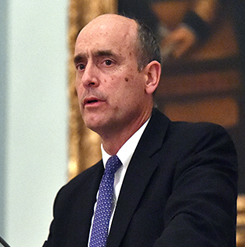CAMBRIDGE, MA—September 7, 2017—James E Baker, former chief judge of the US Court of Appeals for the Armed Forces, joins the MIT Center for International Studies (CIS) as a Robert E Wilhelm Fellow.
Judge Baker retired from the United States Court of Appeals for the Armed Forces after fifteen years of service, the last four as chief judge. He currently chairs the American Bar Association (ABA) Standing Committee on Law and National Security and is a presidential appointee to the Public Interest Declassification Board.
While at MIT, Baker will conduct an unclassified study for the Intelligence Advanced Research Projects Activity (IAPRA) on emerging technologies and national security law and process. He aims to contribute to the scholarship at CIS through a series of presentations on the role law and process should play in national security decision-making and how law and process wisely used can lead to better results.
His work complements the work of the Center’s Program on Emerging Technologies (PoET), directed by Kenneth Oye, professor of political science at MIT. “The Program on Emerging Technologies will be enriched by Judge Baker’s insights into policy issues at the intersection of law, ethics, security, and technology. His practical experience and scholarship on managing tradeoffs across secrecy and sharing and intelligence and his current research on uses of emerging technologies will be of keen interest to many at MIT,”said Oye.
“We are honored to have James Baker at CIS as our incoming Wilhelm Fellow. His knowledge of law and national security will supplement the work being done by our scholars,” said Taylor Fravel, acting director of CIS, associate professor of political science, and member of the Security Studies Program at MIT.
“The Wilhelm Fellowship gives me the time and space to look over the horizon at some of tomorrow’s (and today’s) national security challenges. And, I will have the opportunity to do so with the world class thinkers at CIS,” said Baker.
Baker previously served as special assistant to the president and legal adviser to the National Security Council (NSC) (1997-2000) and deputy legal adviser to the National Security Council (1994-1997), where he advised the president, vice president, national security advisor, and NSC staff on US and international law related to intelligence, counterterrorism, foreign assistance, and military operations, among other things. He served as “general counsel” to the NSC; and, advised the Principals Committee (i.e., the secretaries of state and defense, the national security advisor, the director of Central Intelligence (DNI/DCIA), and chairman of the Joint Chiefs of Staff) and the Deputies Committee (the deputies to the principals). Baker has also served as counsel to the president’s Foreign Intelligence Advisory Board and Intelligence Oversight Board.
He has also served as an attorney at the Department of State, a legislative aide and acting chief of staff to Senator Daniel Patrick Moynihan, and as a Marine Corps infantry officer, concluding his reserve service in 2000 upon joining the USCAAF.
Baker is the author of In the Common Defense: National Security Law for Perilous Times and, with Michael Riesman, Regulating Covert Action, as well as numerous chapters and articles on national security law, intelligence, and ethics.
He has been appointed adjunct or visiting professor at Yale, Iowa, Washington University, Pittsburgh, and Georgetown, teaching courses on national security law, ethics, leadership, and federal courts.
His awards include the 1999 Colonel Nelson Drew Memorial Award (the National Security Council’s highest honor), the Director of Central Intelligence's “Director's Award,” and an honorary Master of Military Art and Science Degree from the US Army Command and General Staff College.
He holds a BA and a JD from Yale University.
_____________________________________
A generous gift from Robert E Wilhelm supports the Center's Wilhelm fellowship. The fellowship is awarded to individuals who have held senior positions in public life and is open, for example, to heads of non-profit agencies, senior officials at the State Department or other government agencies, including ambassadors, or senior officials from the UN or other multilateral agencies. Previous Wilhelm Fellows include: Lourdes Melgar, Mexico's former deputy secretary of energy for hydrocarbons; Paul Heer, former national intelligence officer for East Asia; Joel Brenner, former NSA inspector general; Ambassador Barbara Bodine; Admiral William Fallon; and Yukio Okamoto, a former special advisor to the prime minister of Japan.



